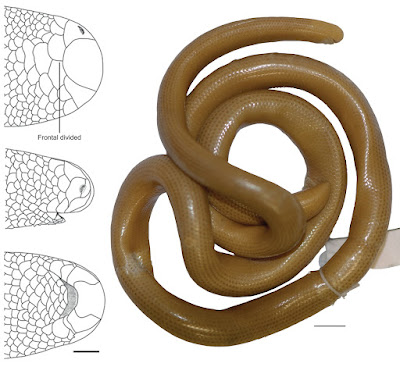Abstract
A new species of Liotyphlops Peters, 1881, Liotyphlops palauophis sp. nov., is described from the neighborhoods of Bogota, Colombia from a previous syntype of L. anops, and a lectotype is designated for the latter species. The new species is readily distinguished from congeners by having the frontal scale divided (vs single), and a central foramen in the parabasisphenoid (vs foramen absent). High-resolution x-ray computed tomography (HRXCT) was used to study and present data on the skull of the holotype of the new species, the lectotype of L. anops, and the holotype of L. ternetzii. Additionally, extensive study of skull characters and external morphology failed to find diagnostic characters to differentiate L. beui and L. ternetzii, and the former is here considered a junior synonym of L. ternetzii, which is also redescribed.
Keywords: Biodiversity, Liotyphlops palauophis sp. nov., neotropics, reptiles, Scolecophidia, taxonomy
 |
| Holotype of Liotyphlops palauophis sp. nov., AMNH R-9550, 361.2 mm TL, Colombia, neighborhood of Bogota. Scale bar: 5 mm. |
Liotyphlops palauophis sp. nov.
Diagnosis: Liotyphlops palauophis sp. nov. is distinguished from all other Liotyphlops by having the frontal scale divided (vs single) and a central foramen in the parabasisphenoid (vs foramen absent). It is further distinguished from L. albirostris, L. argaleus, L. bondensis, L. caissara, L. haadi, L. trefauti, and L. wilderi in having two scales (vs one scale) contacting the posterior edge of the nasal between the second supralabial and prefrontal. It is further distinguished from L. beui, L. schubarti, L. taylori, and L. ternetzii by having four (vs three) scales contacting the posterior edge of the prefrontal. It is distinguished from L. anops by having 28/26/26 scales around the body and 19 subcaudal scales (vs 26/24/24 scales around the body and 12–14 subcaudal scales), and from L. sousai in having 573 dorsal scales and 561 ventral scales (vs 439 dorsal scales and 427 ventral scales).
Etymology: The species name is in honor of Alfredo Palau Peña (June 10, 1969–August 8, 2020), a Brazilian herpetologist and my friend, who was killed by the COVID-19 virus. A combination of his name Palau and the Greek ophis, meaning snake.
Fidélis Júnio Marra Santos. 2023. A New Species of the genus Liotyphlops Peters, 1881 (Serpentes, Anomalepididae) from Colombia and the Synonymization of Liotyphlops beui (Amaral, 1924) with Liotyphlops ternetzii (Boulenger, 1896). ZooKeys. 1146: 87-114. DOI: 10.3897/zookeys.1146.94607

